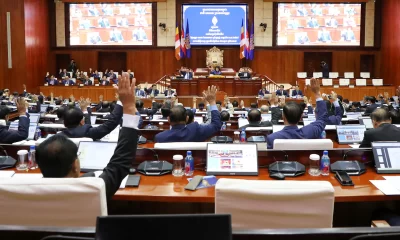News
CBN: Exchange rate gap narrows on expanding FX inflows
Price and exchange rate stability are key responsibilities the Central Bank of Nigeria (CBN) continues to entrench in the Nigeria macroeconomic environment. Sustaining these roles takes a lot of policy implementation ensuring that domestic and foreign investors’ interest in the economy continues to soar.
In recent months, analysis of FX inflows in the last few months showed that Nigeria attracted nearly $6 billion monthly inflows from May 2025 till date. Industry report showed that Nigeria’s foreign exchange market witnessed a significant boost in May, with total inflows rising by 62.0 per cent monthon- month (M-o-M) to $5.96 billion, driven largely by increased participation from domestic and foreign investors.
This marked one of the highest inflow levels in recent months and signals improving market sentiment amid macroeconomic reforms and a relatively stable naira. The naira closed the week at N1,570/$ at the parallel market, and N1,536/$ at the official market, creating a rate gap of N34/$. In an emailed note to investors, analysts at Financial Derivatives Company Limited attributed rising FX inflows to surge in oil prices and multiple inflow channels created by the Central Bank of Nigeria.
The Central Bank of Nigeria (CBN) has in recent months, activated multiple FX sources to increase dollar inflows, boost dollar access to manufacturers and retail end users and support naira recovery across markets. From moves to improve diaspora remittances through new product development, the granting licenses to new International Money Transfer Operators (IMTOs), implementing a willing buyerwilling seller FX model, and enabling timely access to naira liquidity for IMTOs, the apex bank has simplified dollarinflow channels for authorized dealers and other players in the value chain. Given that FX inflows to the economy are strategic in achieving monetary and fiscal policy stability, the CBN under its Governor, Olayemi Cardoso puts in a lot of effort in attracting more inflows into the economy.
Diaspora remittances to Nigeria, estimated at $23 billion annually remain a reliable source of forex to the domestic economy. There are also other sources and policies that are being explored by the apex bank to keep dollar inflows coming. The CBN’s initiatives have supported continued growth in these inflows, aligning with the institution’s objective of doubling formal remittance receipts within a year. The remittances in the economy is expected to increase based on CBN’s ongoing efforts to bolster public confidence in the foreign exchange market, strengthen a robust and inclusive banking system, and promote price stability, which is essential for sustained economic growth. Director of Trading at Verto, Charlie Bird, said dollar liquidity dynamic is now more balanced, with foreign investors and airlines able to repatriate funds. Speaking during Cordros Asset Management seminar titled: “The Naira Playbook”, he said Nigeria is now darling of foreign investors because of improved dollar liquidity in the economy due to positive CBN’s reforms. For instance, the CBN under Cardoso, recently announced the introduction of two new financial products designed to serve Nigerians living abroad and attract more diaspora remittances. These and other measures, including the granting licenses to new International Money Transfer Operators (IMTOs), implementing a willing buyerwilling seller model, and enabling timely access to naira liquidity for I n t e r n a t i o n a l M o n e y Tr a n s f e r Operators (IMTOs).
The CBN r e c e n t l y released the r e v i e w e d guidelines of International M o n e y Tr a n s f e r Services in N i g e r i a . T h e s e Guidelines mark a significant shift in how IMTOS conduct their operations, reflecting the CBN’s ongoing efforts to enhance transparency and efficiency in foreign exchange transactions and to bolster diaspora remittances into Nigeria. Further circular titled “New Measures to Enhance Local Currency Liquidity for Settlement of Diaspora Remittances” highlighted the apex bank’s commitment to improving the Nigerian foreign exchange market infrastructure by increasing the flow of remittances through formal channels. It introduces measures aimed at providing licensed IMTOs with access to Naira liquidity from the CBN, facilitating the disbursement of remittances to beneficiaries.
Net FX reserves position rises
Olayemi Cardoso-led Central Bank of Nigeria (CBN) recently announced a quantum leap in the net FX reserve position at $23.11 billion at the end of last year. Cardoso had upon assuming office in October 2023, prioritized reforms to rebuild Nigeria’s economic buffers and strengthen resilience. In the foreign exchange market, the apex bank faced a backlog of over $7 billion in unfulfilled commitments and a fragmented FX regime characterized by multiple forex rates, which had encouraged arbitrage opportunities.
This regime stifled muchneeded foreign investment, and led to the depletion of our external reserves which fell to $33.22 billion in December 2023. “Over the past year, we have undertaken critical reforms to unify Nigeria’s exchange rate, eliminating distortions and restoring transparency. This unification has enabled us to clear the outstanding foreign exchange obligations, giving businesses—ranging from manufacturers to airlines—the confidence to plan and invest in the future. To further enhance the functionality of the foreign exchange market, we are introducing an electronic FX matching system, which has proven effective in other markets,” Cardoso said. According to the apex bank data, NFER stood at $23.11 billion, the highest level in over three years, a marked increase from $3.99 billion at year-end 2023, $8.19 billion in 2022, and $14.59 billion in 2021. The NFER, which adjusts gross reserves to account for near-term liabilities such as FX swaps and forward contracts, is widely regarded as a more accurate indicator of the foreign exchange buffers available to meet immediate external obligations. Gross external reserves also increased to $40.19 billion, compared to $33.22 billion at the close of 2023. The increase in reserves reflects a combination of strategic measures undertaken by the CBN, including a deliberate and substantial reduction in short-term foreign exchange liabilities, notably swaps and forward obligations. The strengthening was also spurred by policy actions to rebuild confidence in the FX market and increase reserve buffers, along with recent improved foreign exchange inflows, particularly from nonoil sources. The result is a stronger and more transparent reserves position that better equips Nigeria to withstand external shocks. The expansion occurred even as the CBN continues to reduce short-term liabilities, thereby improving the overall quality of the reserve position. “This improvement in our net reserves is not accidental; it is the outcome of deliberate policy choices aimed at rebuilding confidence, reducing vulnerabilities, and laying the foundation for long-term stability,” Cardoso commented.
“We remain focused on sustaining this progress through transparency, discipline, and market-driven reforms.” Reserves have continued to strengthen in 2025. While the first quarter figures reflected some seasonal and transitional adjustments, including significant interest payments on foreign-denominated debt, underlying fundamentals remain intact, and reserves are expected to continue improving over the second quarter of this year. Going forward, the CBN anticipates a steady uptick in reserves, underpinned by improved oil production levels, and a more supporting export growth environment expected to boost non-oil FX earnings and diversify external inflows. The CBN remains committed to prudent reserve management, transparent reporting, and macroeconomic policies that support a stable exchange rate, attract investment, and build long-term resilience.
More FX sources bolster inflows
Foreign capital inflows to the domestic economy remains crucial elements in the drive to achieve monetary and fiscal policy stability. The apex bank is cultivating more sources of FX to increase dollar inflows, boost access to manufacturers and retail end users. From moves to boost diaspora remittances through new product development, the granting licenses to new International Money Transfer Operators (IMTOs), implementing a willing buyerwilling seller FX model, and enabling timely access to naira liquidity for IMTOs, the CBN has simplified dollar-inflow channels for FX dealers to boost business and economic growth. President, Association of Bureaux De Change Operators of Nigeria (ABCON), Aminu Gwadabe, said the policy shifts showed the level of creativity, policy and hard work the Cardoso puts in ensuring that more forex flows into the economy and remain accessible to businesses. He said diaspora remittances to Nigeria, estimated at $23 billion annually remain a reliable source of forex to the domestic economy. There are also other sources and policies that are being explored by the apex bank to keep dollar inflows coming. According to him, the CBN’s initiatives have supported continued growth in these inflows, aligning with the institution’s objective of doubling formal remittance receipts within a year.
The remittances in the economy is expected to increase based on CBN’s ongoing efforts to bolster public confidence in the foreign exchange market, strengthen a robust and inclusive banking system, and promote price stability, which is essential for sustained economic growth. Director of Trading at Verto, Charlie Bird, said dollar liquidity dynamic is now more balanced, with foreign investors and airlines able to repatriate funds. Speaking during Cordros Asset Management seminar titled: “The Naira Playbook”, he said Nigeria is now darling of foreign investors because of improved dollar liquidity in the economy due to positive CBN’s reforms. For instance, the CBN under Cardoso, recently announced the introduction of two new financial products designed to serve Nigerians living abroad and attract more diaspora remittances. These and other measures, including the granting licenses to new International Money Transfer Operators (IMTOs), implementing a willing buyerwilling seller model, and enabling timely access to naira liquidity for International Money Transfer Operators (IMTOs).























